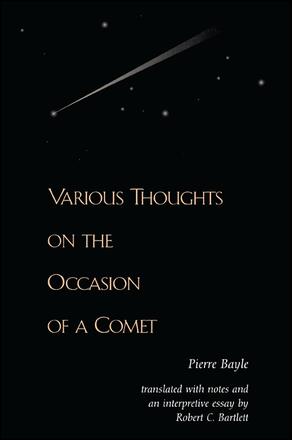
Various Thoughts on the Occasion of a Comet
Alternative formats available from:
A new translation of Pierre Bayle's first great work, which undermines the influence of "superstition" in political life and laid the groundwork for the separation of church and state.
Description
"I tremble when I recall the terrible appearance [the comet] had on Saturday evening in the clear sky, when it was observed by everybody with inexpressible astonishment. It seemed as though the heavens were burning, or as if the very air was on fire…[F]rom this little star stretched out such a wonderfully long tail that even an intellectual man was overcome with trembling; one's hair stood on end as this uncommon, terrible, and indescribable tail came into view…O wonderful almighty God! The heavens show thy might and the earth thy handiwork!" — Eyewitness account of a comet which appeared over Europe on December 24, 1680
The appearance of this comet caused so many panicked inquiries to be made of Pierre Bayle, one of the Enlightenment's greatest thinkers, that he decided to formally respond to them, hence the present work, which first appeared in 1682. The book's principle task was to undermine the influence of "superstition" in political life, and it was here that Bayle made the notorious suggestion, unique in the history of political thought until then, that a decent society of atheists is possible in principle. There is no other English translation of this book in print—the only other version was printed in 1708. This translation is based on a recently revised critical edition of the complete French text and includes a substantial interpretive essay that both elucidates the arguments of the work and indicates the importance of Bayle in the history of the modern Enlightenment.
Robert C. Bartlett is Assistant Professor of Political Science at Emory University. He is the author of The Shorter Socratic Writings of Xenophon: Apology of Socrates to the Jury, Oeconomicus, and Symposium.
Reviews
"All students of political philosophy will be in Bartlett's debt when this is published. Because of Bayle's argument, supporters of religion today have great difficulty in assuming that religion is the only way to morality. Everybody in the field has heard of Bayle, and most are vaguely aware of the significance of his argument, but few have read him; and Bartlett now makes this easy. " — Harvey C. Mansfield, Harvard University